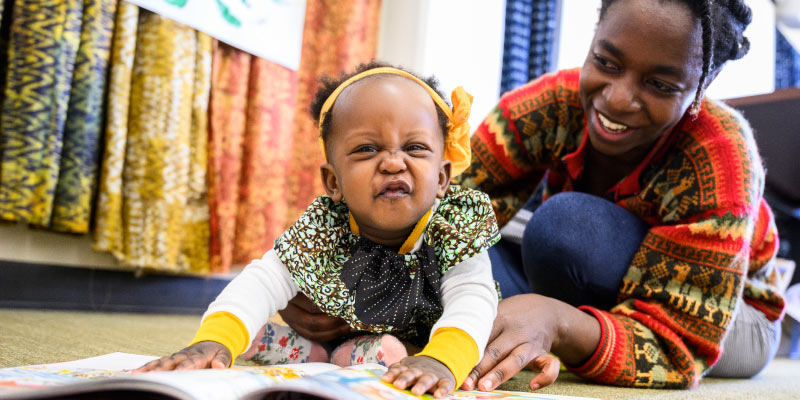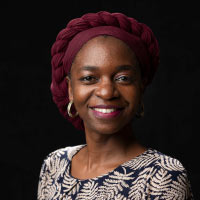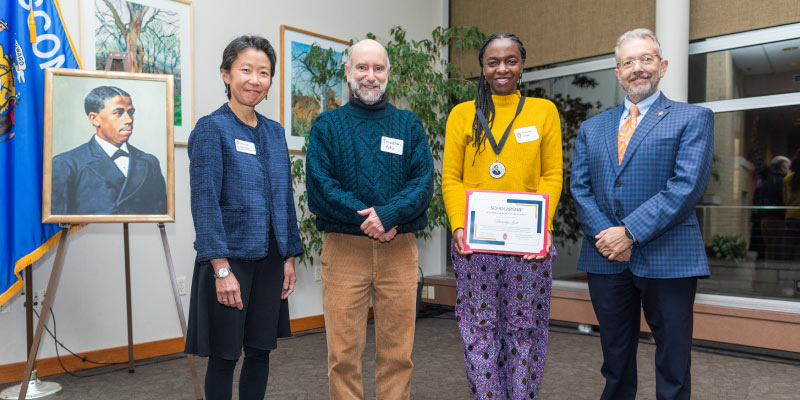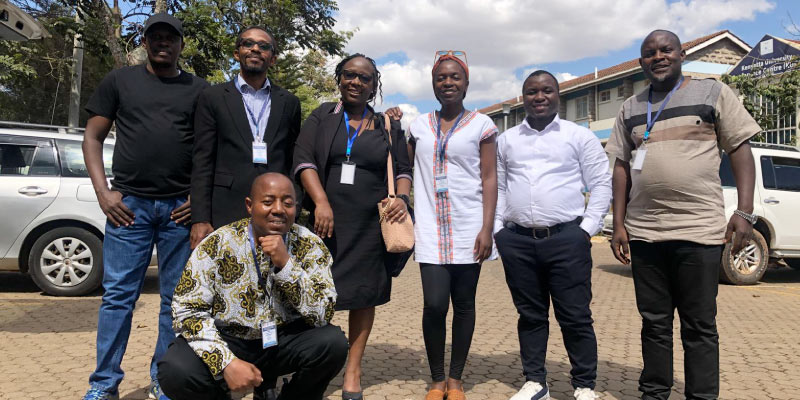
Dorothy Lsoto never imagined she would be earning her doctorate in environment and resources at the Nelson Institute for Environmental Studies.
Never mind the nearly 8,000 miles of land and sea between her hometown of Kampala, Uganda, and UW–Madison, Lsoto hadn’t even considered a career in the environment. Her heart was set on pursuing a law degree. But after getting accepted into a prestigious private law school with a hefty price tag, Lsoto made a selfless decision. She put her family first: changing her degree and attending a public university in Uganda for a much lower cost, saving her parents and seven siblings from the burden of her tuition.
“If I had decided to study the law, I knew that my sisters and brothers were not going to be able to go to school,” Lsoto explained. “I made up my mind at that point to tell my dad that I wasn’t interested in the law anymore. He was shocked because he knew that’s what I wanted to do.”

Lsoto began her undergraduate degree in environmental studies at Makerere University in Kampala, Uganda. It was hard work, not only keeping up with her science-based studies but also accepting her new path. “When I began the program, I was very sad because I knew I wasn’t going to achieve the dream that I wanted, and I had to convince all my friends and relatives that studying the environment was what I wanted to do,” Lsoto said.
In her last year of undergrad, Lsoto was introduced to renewable energies. A light bulb (most likely of the LED variety) went off in her head: she could help her community through clean technologies, like introducing clean cookstoves to households instead of using firewood to cook. “I want to fight for people who can’t fight for themselves,” Lsoto said. “This was my chance to help my, now late, grandma, and women like my grandma, in Uganda.”
“It was powerful to be there and represent the Nelson Institute. I feel proud of those moments because I’m not just contributing to myself, but to the institute and the people that I work with.”
— Dorothy Lsoto
Lsoto then joined the Makerere University Center for Research in Energy and Energy Conservation (CREEC) where she worked on a variety of research projects centered around renewable energy. She also joined entrepreneurial ventures to implement cookstove, pico-hydro, household solar, and biogas systems in Uganda. Through these projects, Lsoto met two Nelson PhD students, Sarah Stefanos and Aleia McCord, who then introduced her to Nelson faculty members Jonathan Patz and Rebecca Larson.

With their encouragement, Lsoto spent six weeks visiting UW–Madison, meeting professors, learning about the environment and resources program, and getting to know the area. “I am very grateful to Aleia and Becky because they played a very big role getting me to come to Madison and helped me pick my research topics,” Lsoto said, adding that McCord even helped her navigate the new educational landscape of graduate school in the United States. “Aleia has been my biggest advocate academically, professionally, and personally. She’s my biggest cheerleader.”
In addition to her newfound support system, Lsoto found her master’s necessary to be taken seriously in her field. “Most of the energy-related projects worked with women but often excluded them from decision-making besides their voices being absent from 30 years of failed cookstove interventions,” Lsoto explained. “Sometimes I would recommend things because I know what these women and communities wanted, but then it was different from what the international funders wanted.”
Seeing how projects were funded and implemented got Lsoto to think: what if she designed her own projects? This question, along with a new interest in exploring policy and air quality, drove Lsoto to continue her studies and develop a PhD at the Nelson Institute which she is currently pursuing. Patz, whose research interests match her own, serves as her advisor. “I enjoyed his class so much because we talked about climate change and things that were affecting the people where I come from,” Lsoto said. “I made a connection between his class and my reality.”

As a graduate student, Lsoto teaches a capstone class that focuses on air quality and equity in African cities. Through this class, Lsoto connected with policymakers in the National Environment Management Authority of Uganda, equivalent to the Environmental Protection Agency in the United States, and was asked to take part in writing Uganda’s first National Environment Air Quality Standards Regulations and the Kampala Clean Air Action Plan with the Kampala Capital City Authority (KCCA). “It was powerful to be there and represent the Nelson Institute. I feel proud of those moments because I’m not just contributing to myself, but to the institute and the people that I work with,” Lsoto said.
Adding to her accomplishments, Lsoto was awarded the University Corporation for Atmospheric Research (UCAR) Next Generation Fellowship in September 2024, which will support her as she continues her PhD research. She is also a 2025 Edward Alexander Bouchet Graduate Honor Society Scholars and has been selected to join the Phi Beta Kappa Society. “When I am researching, I don’t see it as just me working on my PhD. I know that my niece, who has not seen anyone in my family with a PhD, will see me with one, and maybe she’ll choose to do that, too,” Lsoto said. “Ultimately, I want to encourage other women, who may not see themselves represented in this field, to see themselves through me.”